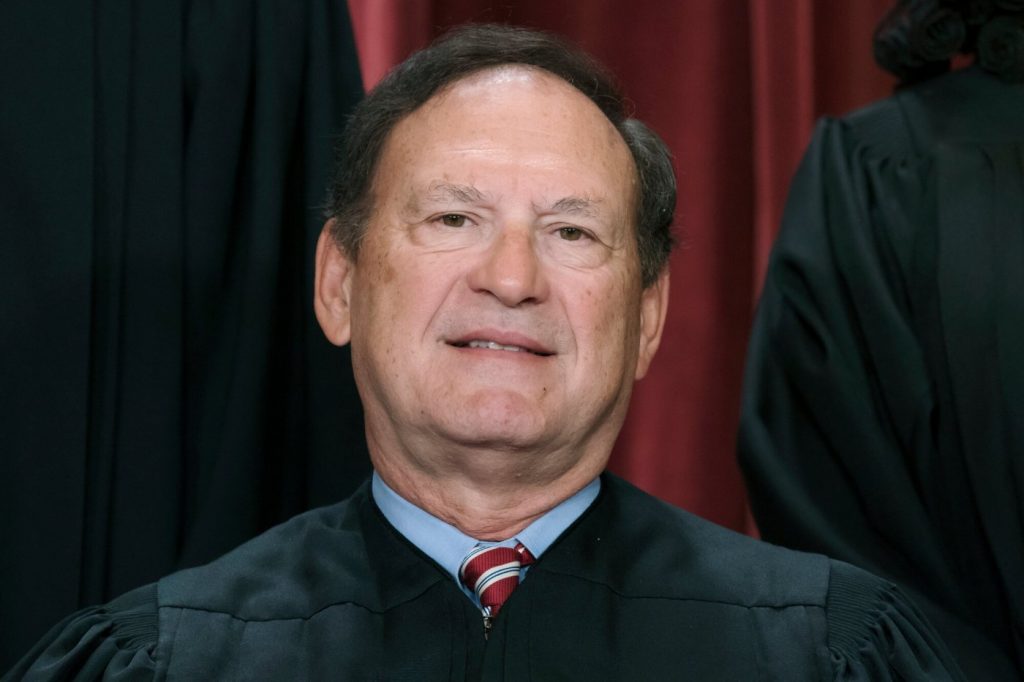By John Fritze | CNN
Justice Samuel Alito drew sharp condemnation Friday following revelations that an upside-down American flag was flown outside his home after the January 6, 2021, attack on the US Capitol, a development that renewed calls on the left for Congress to impose ethics standards on the Supreme Court.
The New York Times published on Thursday a photograph of the flag that it said was seen at the justice’s home in Alexandria, Virginia, on January 17, 2021, days before President Joe Biden’s inauguration. Alito told the Times he had “no involvement” in the flag’s hanging and said it was “briefly placed” there by his wife.
The explanation didn’t satisfy critics, who noted the Supreme Court is hearing several cases this year involving the aftermath of the 2020 election. The upside-down flag became a symbol for former President Donald Trump’s supporters who falsely claimed widespread fraud in the election.
“This stuff’s not normal,” Minnesota Gov. Tim Walz, a Democrat, told CNN on Friday. “I’m just stunned that we would ever have had to have a Supreme Court justice explain why his wife was flying a flag upside down in response to an … insurrection.”
Last fall, in response to a series of revelations about travel accepted by Alito and Justice Clarence Thomas, the Supreme Court adopted a code of conduct for the first time. That code guides the justices to “refrain from political activity,” and several judicial ethics experts speculated the incident with Alito was serious enough to violate those provisions.
“Displaying a political symbol like this, with a clear message about the 2020 election given the timing, in the front yard of one’s home falls under this code provision, and Justice Alito should disqualify himself from cases related to the 2020 election challenges,” said Renee Knake Jefferson, a law professor at the University of Houston Law Center.
“But the code does not require him to do so,” Jefferson added. “Ultimately, it is his decision alone to make.”
By adopting the code of conduct last year, Chief Justice John Roberts appeared to head off Democratic efforts in Congress to impose an ethics code on the high court. But the code’s provisions are self-enforced, and many of the court’s critics argue the document doesn’t adequately address scandals that have plagued the high court for years.
“If a judge on any other federal court had done this, the allegation would be investigated because it calls into question a person’s ability to fairly decide a case,” Sen. Sheldon Whitehouse, a Rhode Island Democrat and member of the Senate Judiciary Committee, told CNN in a statement.
“Through a long string of problematic behavior that has leaked out in the press, the far-right justices have demonstrated that they too should be subject to an enforceable ethics code,” Whitehouse said. “They are not capable of policing themselves.”
Sen. Dick Durbin, the Illinois Democrat and chairman of the Senate Judiciary Committee, said that the incident was the “latest proof” that Congress should pass ethics reform for the high court.
“Flying an upside-down American flag — a symbol of the so-called ‘Stop the Steal’ movement — clearly creates the appearance of bias,” Durbin said in a statement. “Justice Alito should recuse himself immediately from cases related to the 2020 election and the January 6th insurrection, including the question of the former president’s immunity.”
Republicans were, at least initially, more muted in their response — or didn’t address the criticism.
Sen. Tom Cotton, an Arkansas Republican who also sits on the Judiciary Committee, blamed the media for attempting to “incite another mob to try to intimidate justices, harass them at home, or worse.”
A spokeswoman for the Supreme Court did not immediately respond to a request for comment from CNN.
News of the flag landed at a critical moment in the Supreme Court’s term, as the justices race to finish opinions before their self-imposed end-of-June deadline. Public support for the court has remained near historic lows since the overturning of Roe v. Wade in 2022. And there have been signs that the combination of controversial cases and ethics scandals have frayed relationships internally.
Related Articles
Report: Upside-down US flag flew at Justice Alito’s home in 2021
Supreme Court sides with the Consumer Financial Protection Bureau, spurning a conservative attack
Supreme Court orders Louisiana to use contested map for election
Survey: 8,000 women in states with bans get abortion pills each month
US Supreme Court denies California’s appeal for immunity for COVID-19 deaths at San Quentin prison
During remarks at a judicial conference last week in Alabama, Thomas lamented what he described as a loss of collegiality compared with the court he joined in 1991. Thomas has made similar comparisons before, though he did so early in his remarks last week — and without prompting — suggesting those tensions were still top of mind.
“We may have been a dysfunctional family, but we were a family,” Thomas said at the conference. “It would be inconceivable that anyone would leak an opinion of the court or do anything to intentionally harm one another.”
The Supreme Court is weighing two major cases this term tied to the 2020 election and the attack on the Capitol. In one, the justices are weighing Trump’s claim of absolute immunity from special counsel Jack Smith’s election subversion charges. In another, a January 6 rioter is challenging an obstruction charge filed against him by prosecutors, arguing that Congress intended that law to apply to people destroying evidence, not storming a government building.


